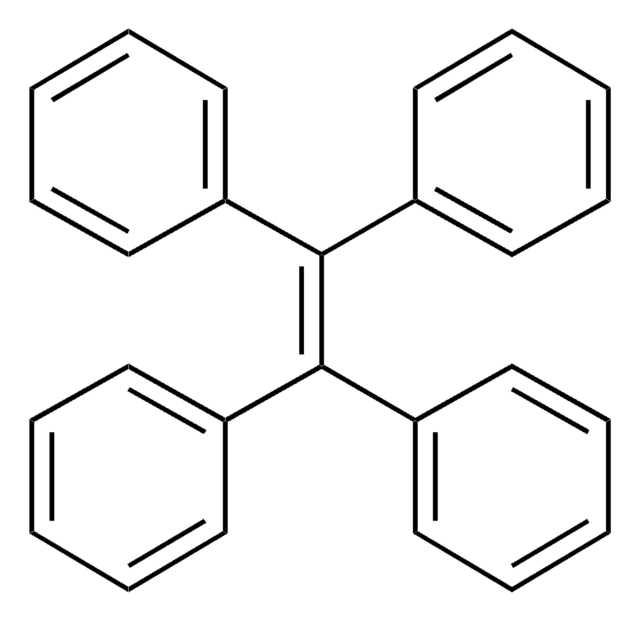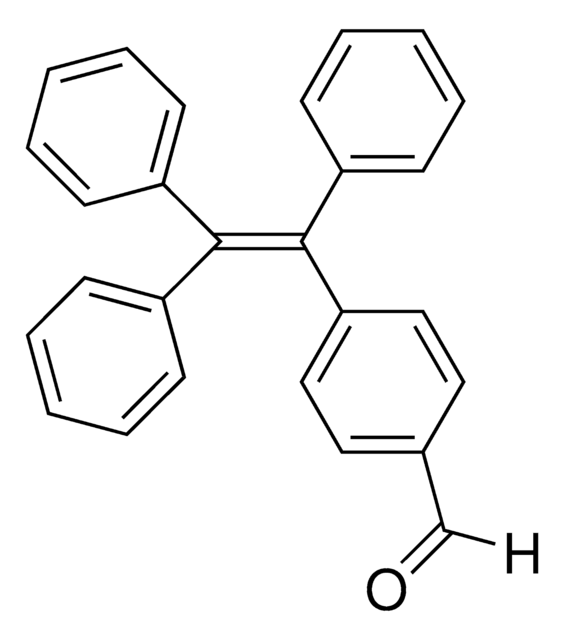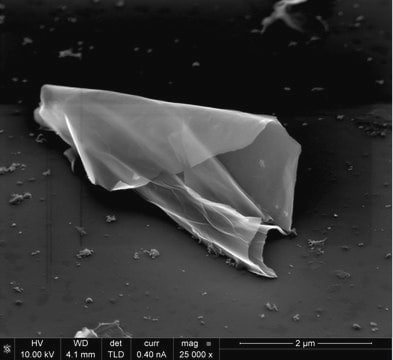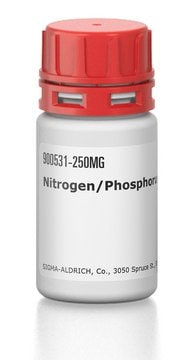900855
1,1,2,2-Tetrakis(4-bromophenyl)ethylene
Synonym(s):
1,1′,1′′,1′′′-(1,2-Ethenediylidene)tetrakis[4-bromobenzene]
Sign Into View Organizational & Contract Pricing
All Photos(2)
About This Item
Empirical Formula (Hill Notation):
C26H16Br4
CAS Number:
Molecular Weight:
648.02
MDL number:
UNSPSC Code:
12352103
NACRES:
NA.23
Recommended Products
form
powder or crystals
Quality Level
solubility
DMF: soluble
DMSO: soluble
THF: soluble
dichloromethane: soluble
storage temp.
2-8°C
General description
AIE (aggregation-induced emission)-active building block.
Storage Class Code
11 - Combustible Solids
WGK
WGK 3
Flash Point(F)
Not applicable
Flash Point(C)
Not applicable
Choose from one of the most recent versions:
Certificates of Analysis (COA)
Lot/Batch Number
Don't see the Right Version?
If you require a particular version, you can look up a specific certificate by the Lot or Batch number.
Already Own This Product?
Find documentation for the products that you have recently purchased in the Document Library.
Nathan D Rudd et al.
ACS applied materials & interfaces, 8(44), 30294-30303 (2016-10-14)
We have designed and synthesized an isoreticular series of luminescent metal-organic frameworks (LMOFs) by incorporating a strongly emissive molecular fluorophore and functionally diverse colinkers into Zn-based structures. The three-dimensional porous networks of LMOF-261, -262, and -263 represent a unique/new type
Natalia B Shustova et al.
Journal of the American Chemical Society, 133(50), 20126-20129 (2011-11-15)
Coordinative immobilization of functionalized tetraphenylethylene within rigid porous metal-organic frameworks (MOFs) turns on fluorescence in the typically non-emissive tetraphenylethylene core. The matrix coordination-induced emission effect (MCIE) is complementary to aggregation-induced emission. Despite the large interchromophore distances imposed by coordination to
Sasanka Dalapati et al.
Journal of the American Chemical Society, 138(18), 5797-5800 (2016-04-26)
Highly luminescent covalent organic frameworks (COFs) are rarely achieved because of the aggregation-caused quenching (ACQ) of π-π stacked layers. Here, we report a general strategy to design highly emissive COFs by introducing an aggregation-induced emission (AIE) mechanism. The integration of
Our team of scientists has experience in all areas of research including Life Science, Material Science, Chemical Synthesis, Chromatography, Analytical and many others.
Contact Technical Service


![B-[4-(1,2,2-Triphenylethenyl)phenyl]boronic acid](/deepweb/assets/sigmaaldrich/product/structures/121/044/864e0829-e1de-4170-aae4-16c2b3ce4111/640/864e0829-e1de-4170-aae4-16c2b3ce4111.png)

![1-{4-[1,2-Diphenyl-2-(p-tolyl)vinyl]phenyl}-1H-pyrrole-2,5-dione](/deepweb/assets/sigmaaldrich/product/structures/269/472/ef436ac0-43aa-4b6e-8061-79bd246ff466/640/ef436ac0-43aa-4b6e-8061-79bd246ff466.png)



